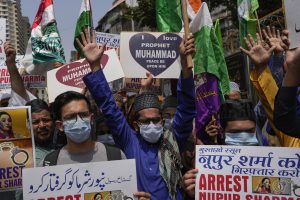Early this week, New Delhi was busy putting out serious diplomatic fires across the Muslim world.
Following derogatory comments on Islam and its revered Prophet Muhammad by leaders of the ruling Hindu nationalist Bharatiya Janata Party (BJP) last week, Arab social media was ablaze with indignation. Then, over a dozen countries and counting — ranging from Saudi Arabia and Iran to the Maldives and Indonesia — lodged unprecedented official protests with Prime Minister Narendra Modi’s government.
The timing of the diplomatic protests is as striking as the protests themselves. The comments made last week by the BJP’s spokespersons were far from the most odious developments in India’s political discourse in recent times.
Over the last couple of years, BJP leaders have participated in conferences that have publicly called for the genocide of Muslims. In 2019, following protests against the controversial Citizenship Amendment Act (CAA), Modi himself told a political rally that the protestors can be identified “by their clothes” — ostensibly referring to the traditional attire worn by Muslims. One minister even called for them to be shot down on the street, calling them “traitors.” He continues to serve in Modi’s cabinet.
Why did the Arab world ignore all these red flags and suddenly decide to draw the line at blasphemous comments on the Prophet?
Part of the imperative is geopolitical. For much of the last few weeks, Israeli forces have been at odds with Palestinians over a host of issues. In April this year, Israeli forces raided the Al-Aqsa mosque in Jerusalem, disrupting prayers and injuring scores of people. Last month, Israeli forces killed a prominent Al Jazeera reporter, Shireen Abu Akleh, in an allegedly targeted attack. A few weeks prior to that, Israel’s high court ruled that about 1,000 Palestinians can be evicted from a part of the West Bank — an unprecedented decision that many believe has paved the way for more such expulsions.
Ordinarily, such escalation in conflict would have provoked a strong diplomatic response from the Arab world. Yet, as many countries in the Gulf adapt to troubles with Iran and economic blowback from the war in Ukraine, things have been markedly different. In the immediate aftermath of Abu Akleh’s killing, Bahrain refused to blame Israel while Saudi Arabia and the UAE refrained from issuing a statement altogether.
Shortly thereafter, the UAE signed a historic trade deal with Israel, covering as much as 96 percent of their bilateral trade and building on the momentum of the Abraham Accords signed a couple of years ago. “We have written a new chapter in the history of the Middle East,” the UAE’s trade minister declared in its wake.
Given the long-running animosity between Israel and its Arab neighbors, this ongoing historic embrace is still largely unpopular among the general Arab public. When the Arab Barometer survey asked respondents in seven Arab countries what they thought of the Abraham Accords, it found favorable opinions from at least 10 percent of the people in only two countries: Lebanon and Iraq. Escalations in Palestine are unlikely to make the Gulf’s policy shifts any more palatable.
Without much strategic space to act against Israel, many Arab governments could turn keener instead to give voice to rising public anger against Hindu nationalism in India, given New Delhi’s relatively weaker footprint in the Middle East.
Already, some governments are concerned that Hindu nationalist sentiments could spread to the Indian diaspora and spark discontent and disorder in their countries. In 2020, a handful of Indians working in the UAE and elsewhere were sacked for sharing Islamophobic posts on social media — in separate incidents. That same year, a Saudi religious scholar tweeted that “militant Hindus” should be expelled from the Gulf, as he promoted the hashtag “send Hindutva back home.”
For India, all of these trends are indisputably disastrous. The Gulf is home to the largest chunk of India’s diaspora abroad and a vital source of remittances. The UAE alone hosts almost 3.5 million Indians — the largest Indian expatriate population in any country, accounting for 20 percent of India’s total remittance inflow. India also imports close to 40 percent of its fuel from Iran and the Gulf. Just as significantly, New Delhi has also long hoped that Iran would act as a gateway into resource-rich Central Asia, bypassing the need to go through Pakistan.
It doesn’t help New Delhi’s cause that criticism of Hindu nationalism has spread far beyond just the Muslim world. Just last week, U.S. Secretary of State Antony Blinken drew attention to “rising attacks on people and places of worship” in India — for the second time in two months.
As it ramps up Hindu nationalist rhetoric at home, the Modi government will find diplomacy progressively tricky overseas.

































